17 April 23 – Peasant struggles are the main frontier of resistance against agribusiness and extractivism
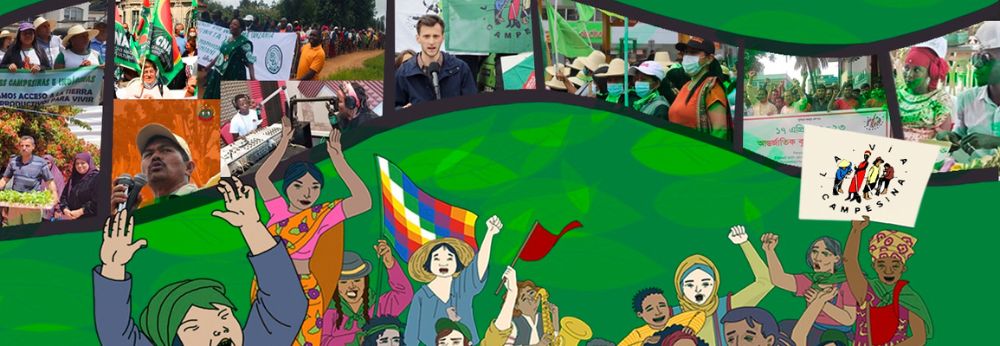
(Bagnolet, May 3, 2023) The International Day of Peasant Struggles is commemorated by La Via Campesina every year on April 17th to remember the massacre of Eldorado do Carajás in 1996. On this day, we also denounce the ongoing criminalization, oppression, and repression of peasants, farm workers, rural women, migrants, and black and indigenous communities around the world.
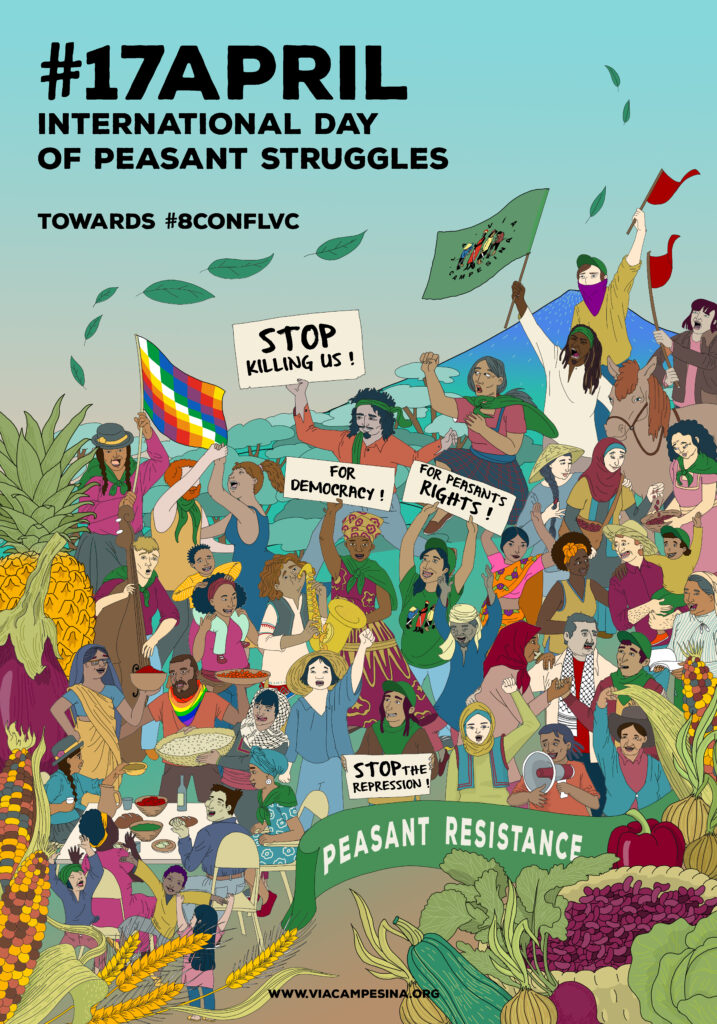
This date is globally commemorated through educational, mass, and mobilization initiatives led by peasant, indigenous, and migrant organizations, as well as farmers and farm workers at large. They stand in solidarity with the struggle for food sovereignty, land rights, popular agrarian reform, and the promotion of peasant agroecology to address the climate crisis and global hunger.
During the 2023 edition of this day, LVC reaffirmed its commitment to defending human rights and life, as outlined in the United Nations Declaration on the Rights of Peasants and Other People Working in Rural Areas (UNDROP), which was adopted in 2018. This instrument recognizes peasants as rights holders and catalysts of change. In the face of territorial encroachment by capital, peasant, indigenous, and landless communities have become the frontline of resistance against the hydro-agro-extractivism perpetuated by transnational corporations.
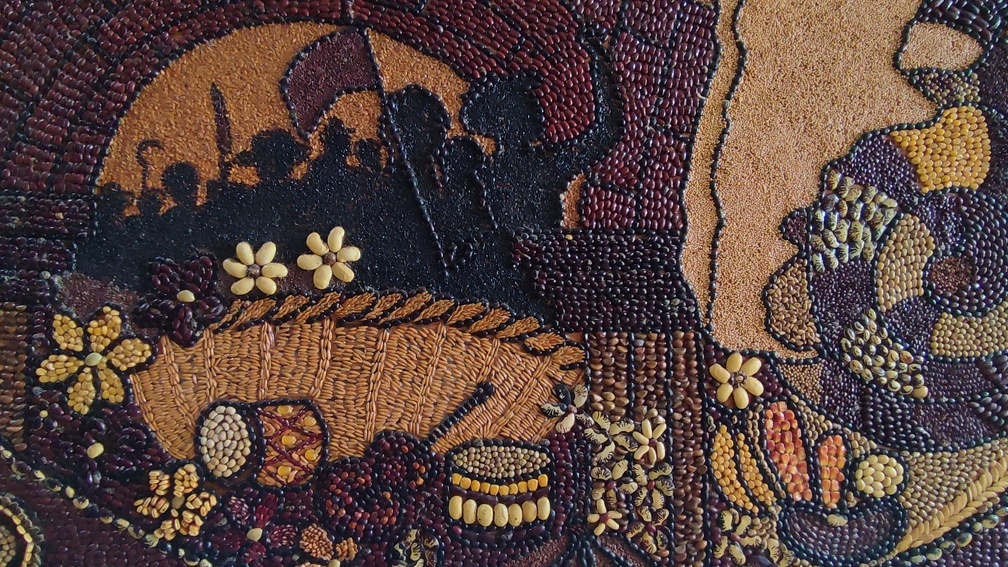
ElDoradoDosCarajas 27 years of impunity, includes accusations of ‘rural militias’.
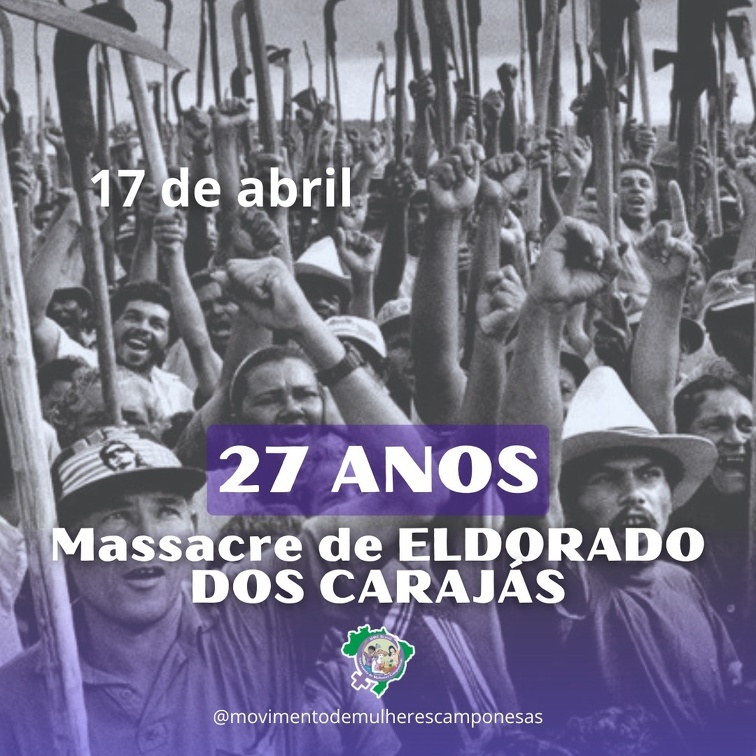
Even after 27 years since the Eldorado do Carajás Massacre, justice continues to elude the people. Meanwhile, the Brazilian movements of La Via Campesina are alerting us to the emergence of new ‘rural militias’. As per the report titled “Conflicts in the Countryside,” published by the Pastoral Land Commission (CPT) on April 17th, Brazil witnessed 47 recorded murders in 2022, with 6 of them being women. It is worth remembering that in 2021, former president Bolsonaro labeled the MST as a “terrorist organization” and advocated for landowners to arm themselves. This remains a pressing concern for social movements today.
Brazil stands out as one of the countries with the most unequal land distribution worldwide. Merely 1% of Brazilians possess over half of the arable land, while small farmers, who make up three-quarters of all producers, only own 20%. This long-standing legacy from the colonial era persists almost unchanged due to the enduring power of landowners, coupled with influential lobbying in Congress and the media. To shed light on these issues and more, the Landless Rural Workers Movement organized numerous actions throughout the country as part of Red April, commemorating the murder of 21 landless workers.
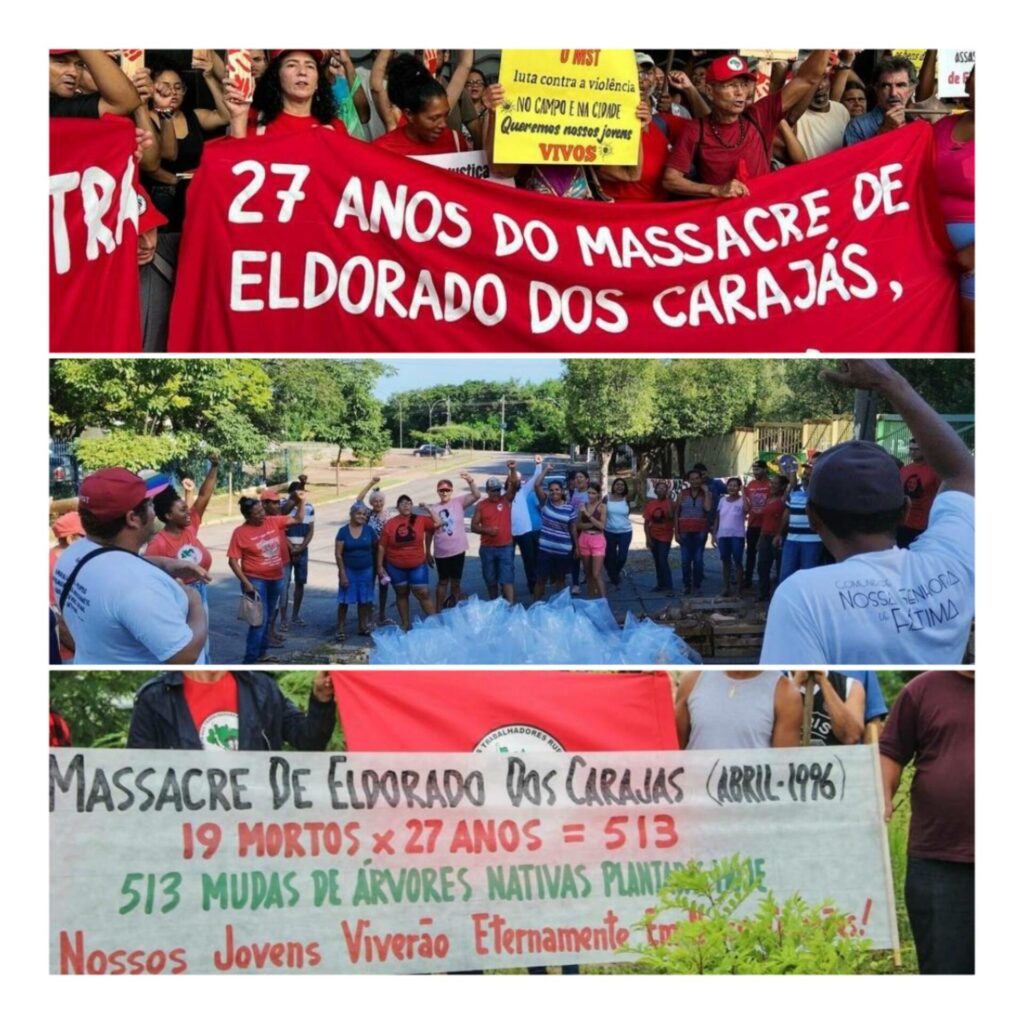
The 17th edition of the Oziel Alves Youth Pedagogical Camp took place at the infamous “S curve,” the site of the massacre where the Military Police of the state of Pará brutally killed the landless workers in 1996. This camp, named in honor of Oziel Alves, the youngest militant who was tragically shot in the forehead at the age of 17 in Eldorado do Carajás, brought together rural youth to underscore the importance of solidarity, training, art, and culture as transformative tools.
Under the slogan “The Agrarian Reform against Hunger and Slavery: for Land, Democracy, and the Environment,” this year’s April Day carried on the legacy and ongoing struggle of the peasants who were brutally murdered 27 years ago. This slogan represents a continuation and a current focus on the fight for land, democracy, and the environment.
This year as part of the global mobilizations, members of La Via Campesina have also drawn attention to and expressed solidarity with the grave violations of rights faced by peasant communities, as well as the systematic criminalization of their leaders in countries including Palestine, Paraguay, Brazil, Colombia, Mali, Ecuador, France, Spain, Thailand, Sri Lanka, Indonesia, South Korea, Kenya, Canada, Haiti, Guatemala, and Peru.
Towards the 8th International Conference in Colombia (#8ConfLVC)
During April 17, 2023, La Via Campesina also launched the slogan and official poster of its VIII International Conference to be held in November in Bogota, Colombia. This is the most important decision-making space for the peasant movement, as well as a space for evaluation, analysis and construction of collective plans.
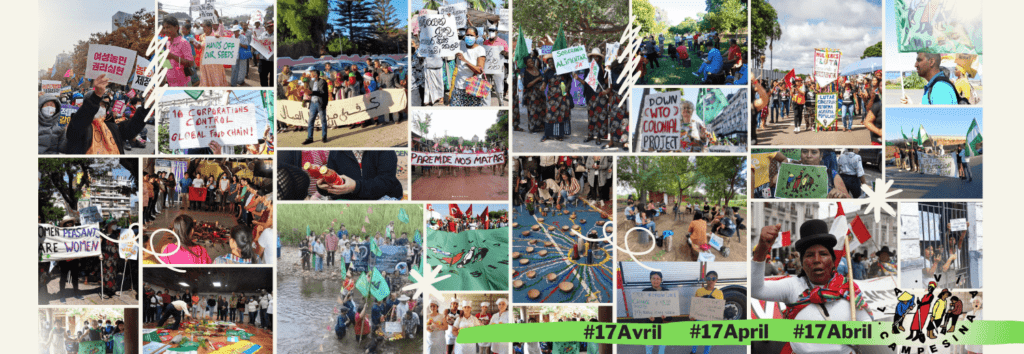
La Via Campesina and Defending Peasant Rights Webinar
La Via Campesina, along with the coalition ‘Defending Peasants’ Rights,’ which comprises organizations dedicated to implementing the UN Declaration on Peasants’ Rights (UNDROP), organized a public webinar. The webinar aimed to explore how organizations and communities utilize the Declaration to raise awareness of their struggles and advocate for their rights as outlined in the Declaration.
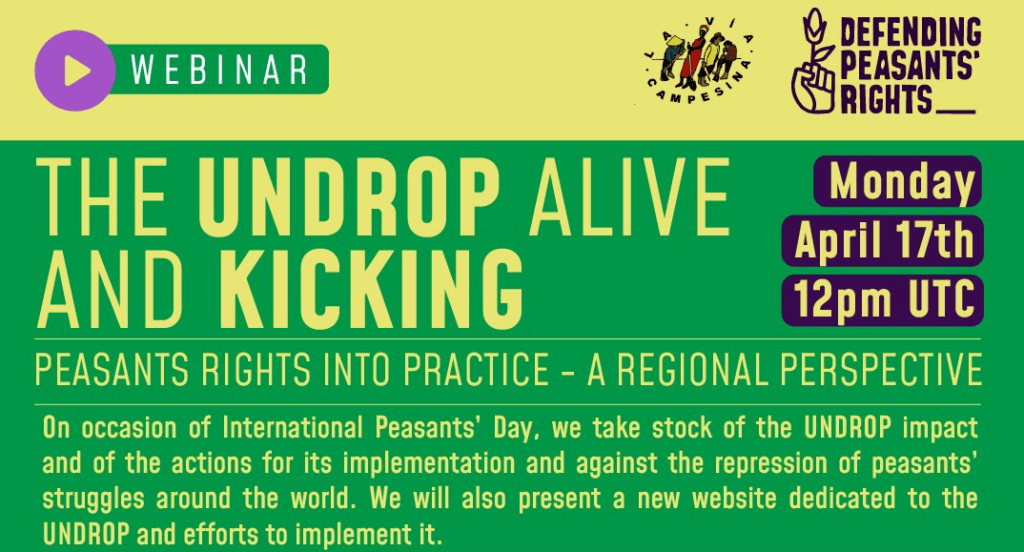
The webinar showcased peasant representatives from various regions who elaborated on the coordination of struggles around the UN Declaration on Peasants’ Rights (UNDROP). They provided insightful examples of the implementation and legal progress made since 2018.
Local actions for global struggles!
Currently, La Via Campesina unites 182 organizations representing peasants, indigenous communities, landless workers, and women from 81 countries worldwide. Through more than 78 actions carried out worldwide, our collective showcased its solidarity. On this important occasion, member organizations and allies expressed their resistance against the harmful consequences of agribusiness and the extractive industry, which pollute the soil, water, and commons. Together, we carried out street interventions, food donations, seed distribution, tree planting, local fairs, forums, and debates to raise awareness about the criminalization of peasant mobilization, the judicial persecution of social leaders, and the prevailing impunity concerning their murders.
As the global movement commemorates its 30th anniversary, its core principles, including Food Sovereignty, Peasant Agroecology, Popular Agrarian Reform, and Peasant and Popular Feminism, are more relevant than ever. In the face of numerous crises across the world, these propositions represent tangible responses from the peasantry, offering an alternative model and a pathway to ensure social justice in all its facets.
Actions in Latin America
In the Dominican Republic, member organizations organized the “Forum on the Impact of Mining, Agroecology, and the Human Right to Water in the Caribbean region.”
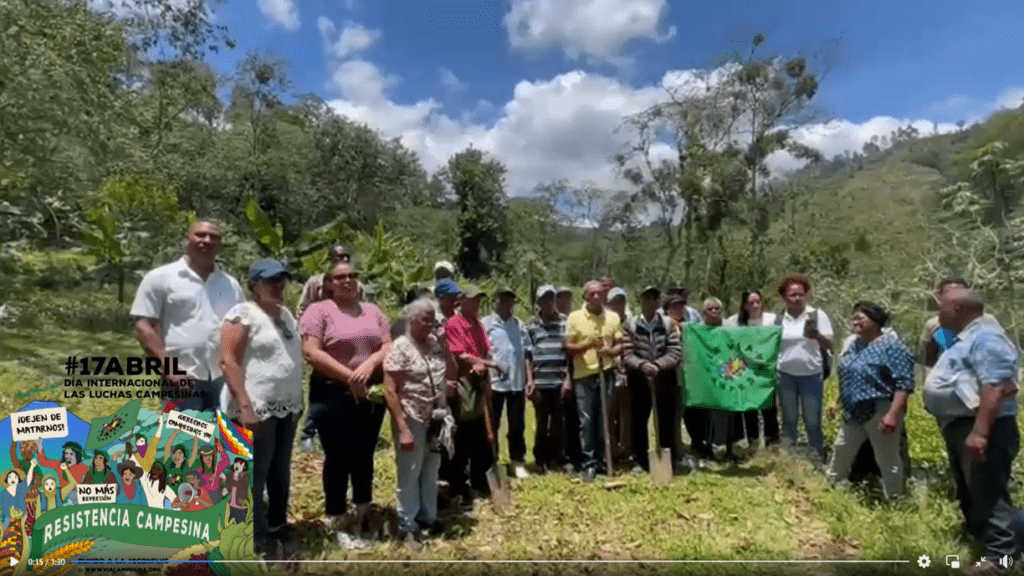
In Haiti, peasants organized under the MPP carried out a denunciation action as part of the #17April23 movement, but they were brutally repressed by the military force BESAP. While mobilizing, the peasants chanted, “Get out, thieves and land grabbers of peasant territories.”
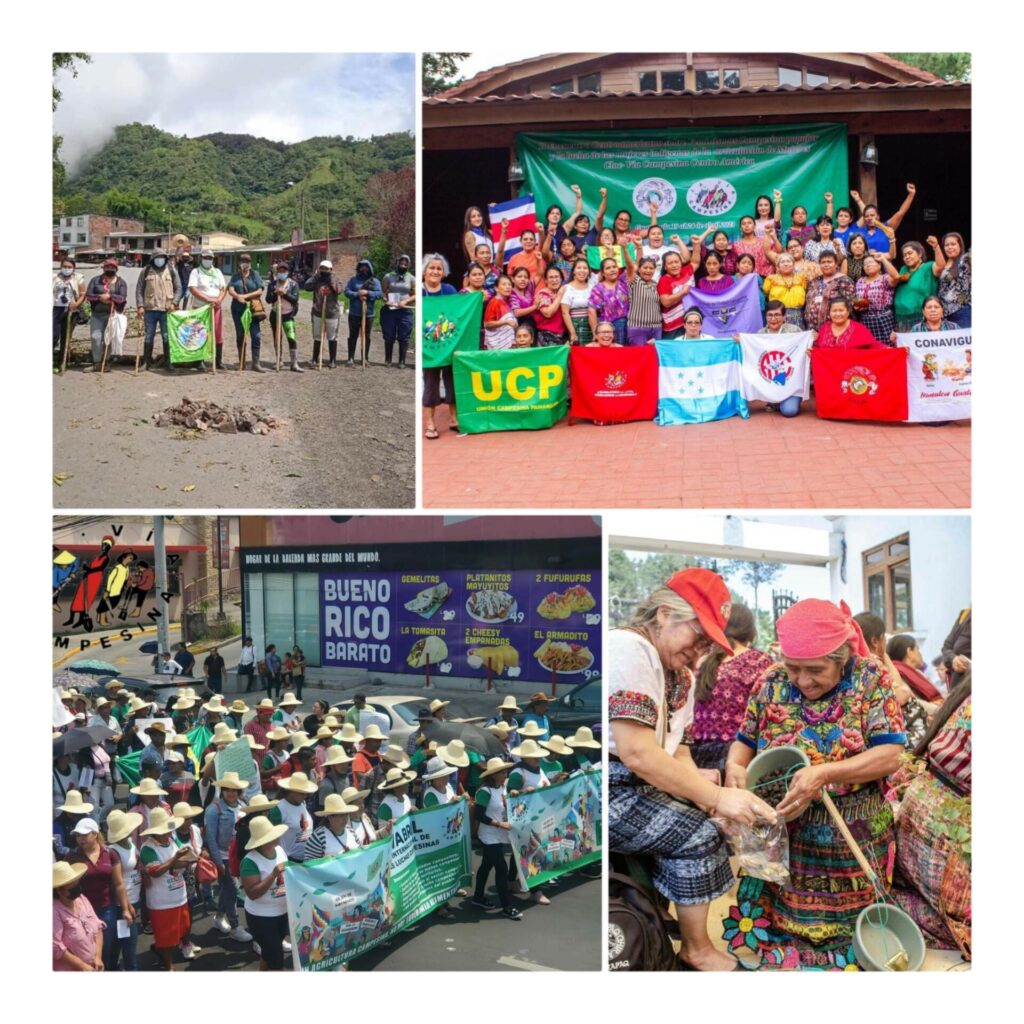
In Guatemala, our members hosted the II Central American Meeting on Popular Peasant Feminism, focusing on the struggle of indigenous women from the CLOC – LVC Central America Women Articulation.
In Honduras, peasant organizations demanded access to land and peasant markets, control of seeds in peasant hands, protection of territories, adequate financing for the peasant sector, and an end to the criminalization of their struggle, as they are the ones who feed the people.
Moving on to South America, more actions unfolded.
In Colombia, our members organized a forum on “Peasantry, Land, and Agrarian Reform in the National Development Plan 2023-2026.”
The LGBTIQ collective of South America created a series of materials to bring visibility to gender diversity and its active participation in all fronts of action and in the defense of food sovereignty. They also denounced the criminalization and LGBTIQ-phobia that leads to the killing of peasants worldwide.
Solidarity Actions in AFRICA AND ARNA Region
The Southern and Eastern Africa region has launched the booklet on the Declaration on the Rights of Peasants, UNDROP, in eight local African languages. This initiative aims to ensure that a wide range of peasants can access, understand, and utilize the UNDROP to protect their rights.
In Tanzania, MVWATA organized 24 local actions across the country with the slogan “Ardhi yetu, Uhai wetu!” (Our Land, Our Life), highlighting peasant struggles and resistance in their territories.
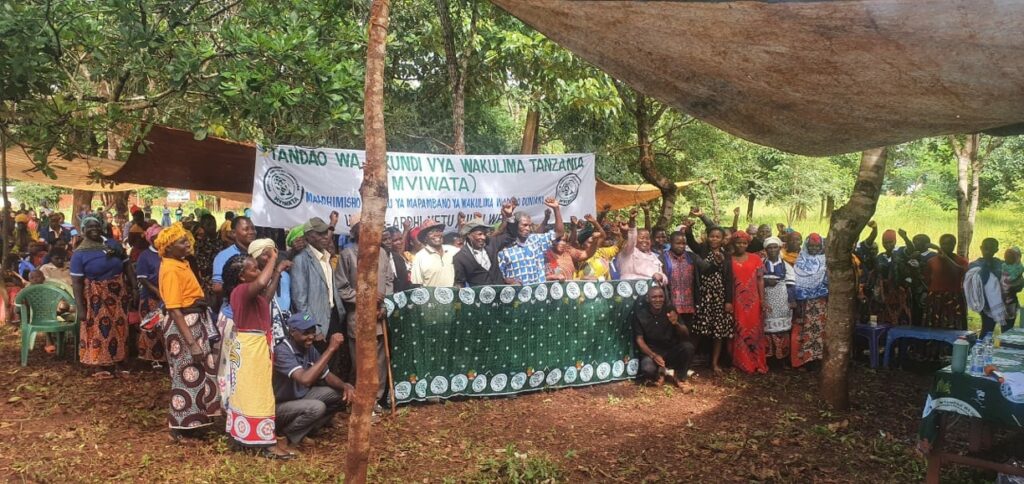
In Mali, the CNOP hosted the second edition of the organic weekend at the AMSD headquarters in Kalaban Koro. This event aimed to promote agroecological and organic products, as well as the principles of Food Sovereignty.
In Palestine, the Union of Farmers’ Committees (UAWC) distributed local seedlings to farmers as part of their commemoration of the International Day of Peasant Struggles 2023.

Actions in ASIA
In Sri Lanka, MONLAR and other social movements used this day of mobilization to raise concerns about the consequences of the agreement with the International Monetary Fund.
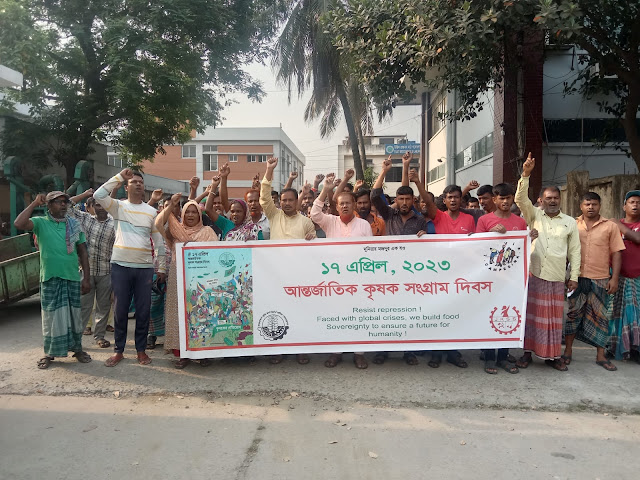
In Indonesia, the SPI held a demonstration to showcase to the President of the Republic of Indonesia the benefits of the family farming model compared to corporate farming.
The Bangladesh Agricultural Farm Labourers’ Federation also mobilized its union members in Gazipur to mark the day.
In Thailand, the Northern Peasant Federation of Thailand reaffirmed its ongoing struggle against injustice, advocating for the right to land, food sovereignty, and food security for farmers and peasants. They emphasized the need for debt relief, land restoration, fair pricing for natural resources such as soil, water, forests, and crops, and an end to free trade practices.
Solidarity Actions in EUROPE
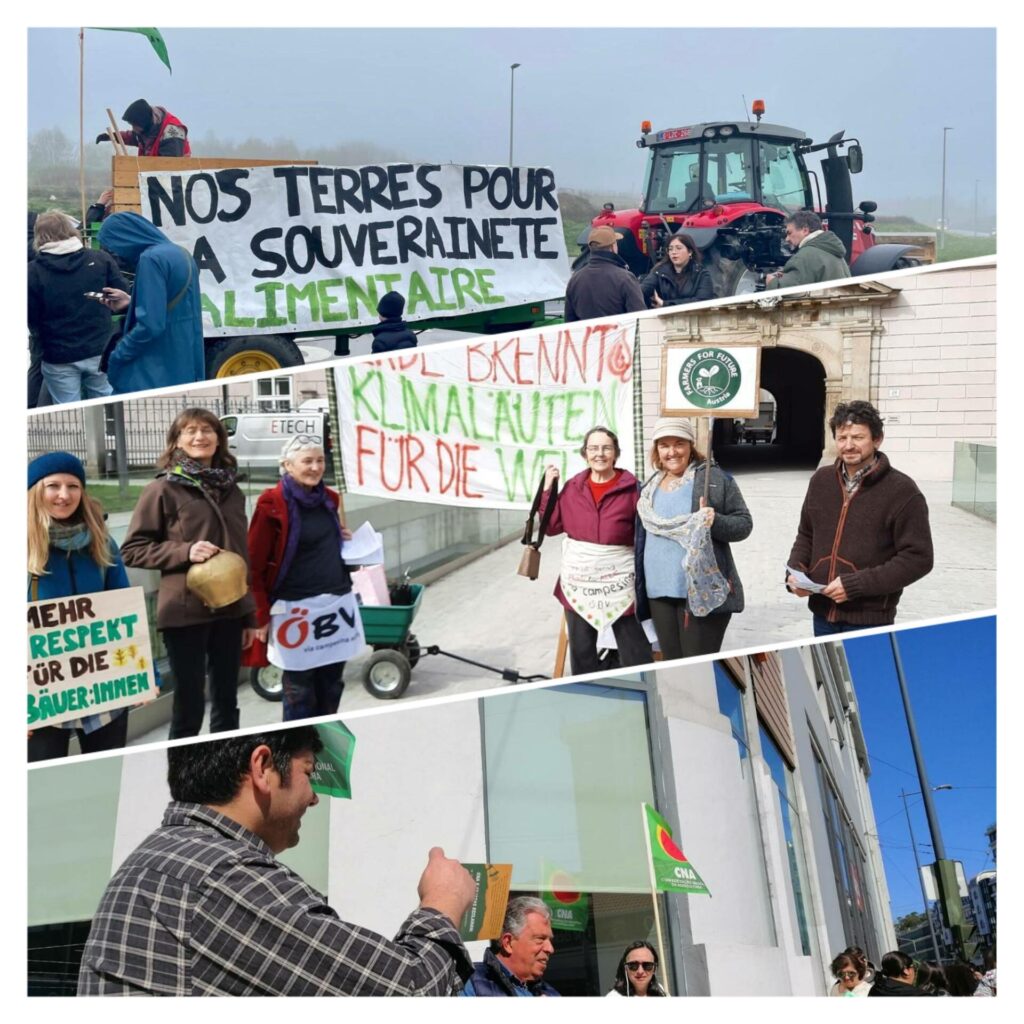
The ÖBV – Via Campesina Austria once again urged politicians to provide effective and equitable solutions to the climate crisis in front of the Parliament, accompanied by the sound of cowbells. The hashtag #FarmersForTheFuture was used to amplify their message.
The National Confederation of Agriculture (CNA), in Portugal, called for fair prices for those who produce quality and accessible food for the people, challenging the dominance of large-scale distribution. The CNA presented concrete proposals and emphasized that, with political determination, it is feasible to establish conditions for the fair pricing of national production, benefiting both farmers and consumers.
For more information and to keep track of all the actions undertaken in different territories, please visit our virtual gallery:
Popular Communication: Training, Agitation, and Mobilization!
Over the past 30 years, we have come to understand that globalizing the struggle and hope is not merely a slogan; it is our political strategy. Throughout this journey, art and culture have played a crucial role in nurturing our diverse peasant culture, with its myriad colors, forms, and worldviews, all united under the banner of food sovereignty and peasant food systems.
In this section, we wish to extend our greetings to all the people’s communication initiatives, as well as the exploration of new formats and narratives by our member organizations and allies. These endeavors allow us to present our proposals and struggles for a better life. We remain committed to sharing the worlds we are actively constructing in our respective territories.
Resisting means organizing ourselves, cultivating values such as education, labor, solidarity, and brotherhood. It means valuing and preserving peasant and popular culture through our actions and communication efforts, thereby strengthening and expanding our social foundations. Through the dissemination of ideas and the mobilization of consciousness, we strive to agitate and engage minds.
Globalize the Hope! Globalize the Struggle!
